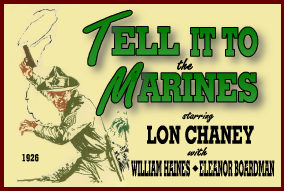

Distributed by Metro-Goldwyn-Mayer
Directed by George Hill
Cast: Lon Chaney (Sergeant O'Hara), William Haines (Private "Skeet" Burns), Eleanor Boardman (Norma Dale), Eddie Gribbon (Corporal Madden), Carmel Myers (Zaya), Warner Oland (Chinese Bandit Chief), Mitchell Lewis (Native), Frank Currier (General Wilcox), Maurice Kains (Harry).
"Tell it to the Marines" tells the story of a wisecracking young recruit (William Haines) whose sole reason for enlisting was to get a free ride to California so he could skip out and go to Tia Juana to gamble. After losing all he has in Mexico, his only choice is to come back to the Marine base in San Diego - no less of a smart-aleck - but under the guidance of tough Sgt. O'Hara (Lon Chaney) - and for the love a beautiful nurse (Eleanor Boardman) - he finally changes his ways and becomes a real Marine.
While not the strongest story line, the picture, nevertheless,
garnered almost universal praise - and still does today. It was
MGM's second highest grossing picture for the year with worldwide
box office receipts of $1.6 million. (1) It is most certainly
a brilliant performance by Lon Chaney, and, as such, he is the
reason the film has stood the 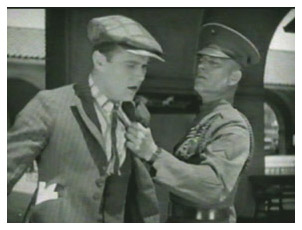 test
of time, and, in this reviewer's opinion, must have been the driving
force behind the film's success in 1927 (it premiered at the Embassy
Theatre in New York on December 23, 1926). Chaney biographer
Michael F. Blake noted, "The film remains one of his finest
performances and demonstrates that he could be a serious actor
without any make-up." (2)
test
of time, and, in this reviewer's opinion, must have been the driving
force behind the film's success in 1927 (it premiered at the Embassy
Theatre in New York on December 23, 1926). Chaney biographer
Michael F. Blake noted, "The film remains one of his finest
performances and demonstrates that he could be a serious actor
without any make-up." (2)
And that is part of the appeal. Chaney's legacy is that of a make-up artist, to which the nickname by which he is remembered - "The Man of A Thousand Faces" - attests. However, films such as "Tell it to the Marines," "The Unholy Three" (1925) and even the earlier "Outside the Law" (1921) demonstrate very clearly, Chaney was an outstanding actor without make-up. Viewing the film, one can easily believe that he must have been a Marine drill sergeant at some time in is life (although he wasn't) so real and convincing is his performance.
One can go on and on with laudatory prose about Chaney - he is deservedly one of the most revered actors in cinema history. However, equal screen time (if not more) is given to William Haines as the wisecracking young recruit "Skeet" Burns. Haines excelled at this type of characterization - the obnoxiously egotistical cut-up who takes nothing seriously and, therefore, ends up getting himself in trouble. Nevertheless, no matter how obnoxious he is or how many people he may have hurt in his past, his movies expect us to sympathize with him when he realizes the error of his ways and repents - usually for the love of a girl. Look at his portrayal of Tom Brown in "Brown of Harvard" (1926), Jack Kelly in "Spring Fever" (1927) or Brice Wayne in "West Point" (1927) - this one a virtual repeat of "Tell it to the Marines" without the benefit of Chaney - and you will see that this characterization served Haines well - at one point in his career being named the number one male box office draw. (3)
Haines certainly plays the cocky, arrogant and obnoxious part to the hilt in "Tell it to the Marines." Although he deserves credit for filling the role admirably, author Richard Schayer's creation leans so much toward the obnoxious that it is difficult to muster any compassion for Burns when the story calls for audience sympathy.
An example of this occurs in his first attempt to "be alone" with beautiful Navy nurse Norma Dale. After being dismissed from training for the afternoon, he goes across the street from the base, rents a car, drives back and waits outside the infirmary for Norma. A very humorous sequence occurs when Sgt. O'Hara walks up just as Norma is coming out. Seeing Burns waiting on her in the car, O'Hara asks Norma if she'd like his chauffeur to drive her to the car line where she waits for the street car downtown. It appears Burns has been outsmarted as he "chauffeurs" the two in the backseat to the point where Norma is to the streetcar.
She and O'Hara get off downtown. O'Hara tells Burns to be
back at the base by 10:30 or he'll "reduce the population
of Kansas by one." (by the way, excellent title writing by
Joe Farnham). O'Hara leaves, and Norma goes to wait on the streetcar.
But Burns isn't licked yet. He drives up to where Norma is standing
in the middle of the street, 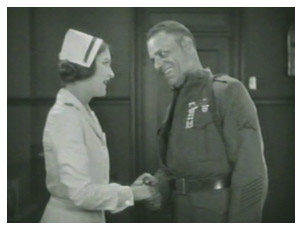 purposely
blocking traffic as he pesters her to ride with him. Norma continuously
refuses, but the angry motorists who are blowing their horn at
the oblivious "Skeet" Burns are too much for her, so
she finally agrees to go with him. Up to this point with Norma,
fine - we view Burns as a little mischievous yet romantic and
assume he may begin to win the pretty nurse's affections during
this time alone with her. However, rather than being romantic,
he becomes so annoying, the viewer will find himself delighting
in Burns receiving some sort of punishment for his behavior.
purposely
blocking traffic as he pesters her to ride with him. Norma continuously
refuses, but the angry motorists who are blowing their horn at
the oblivious "Skeet" Burns are too much for her, so
she finally agrees to go with him. Up to this point with Norma,
fine - we view Burns as a little mischievous yet romantic and
assume he may begin to win the pretty nurse's affections during
this time alone with her. However, rather than being romantic,
he becomes so annoying, the viewer will find himself delighting
in Burns receiving some sort of punishment for his behavior.
So what happens? Well, when we next see the couple, it is now close to midnight. Going down a lonely road, he tries to put his arm around her and she pushes him away. Apparently she has tried for hours to get him to take her home, and he continues to ignore her requests. After being pushed away for the umpteenth time, he cockily remarks, "Don't be dumb, darling . . . you won't be a chicken forever. You know, you ought to encourage me . . . I'm not hard to get." Then, while trying to drive at the same time, he forcibly grabs her and begins kissing her neck. Because she's fighting him off, he runs off the road into a ditch. She gets out of the car and walks angrily away. He follows her. Even though they are out of the city, they fortunately catch a streetcar crossing the road. To add insult to injury, he's broke, and she has to pay their fare. Acting remorseful, "Skeet" tries to talk to her, but she keeps moving away. Of course he continues to move from seat to seat as she moves, eventually sliding in beside her and blocking her ability to move to another seat.
When they arrive back at the base, she walks in the gate, and O'Hara is there. She tells him, "I've met a lot of fresh ones in and out of the service . . . but he breaks all records."
Burns tries to slip back in, but O'Hara catches him and throws him in the brig. As he's being escorted, he looks over and sees Norma about to go in a building. At the door, she stops and looks back at him. In what can only be considered very spiteful, he sneers, "Good night, Miss Squealer!" She goes in, and he bunches his fingers at his lips and throws them out as if throwing her a sarcastic kiss.
This is an example of the development of the character of "Skeet" Burns in this story who, throughout 90 percent of the film's running time, exhibits no redeeming qualities whatsoever. Sadly, we feel as if we should cheer his banishment to the brig. At the very least, he could have continued to exhibit some remorse. Instead, he fails to acknowledge that it was his inconsiderate and arrogant behavior with her - not to mention failure to obey orders regarding the time he should return to base - that resulted in his confinement. Instead, Burns blames Norma for his time in the brig - hardly reasoning we would consider logical.
But then Norma does something that is difficult to understand.
We don't know how long Burns has been in the brig, but the company
is being shipped out. She asks O'Hara a favor - take Burns to
sea with them. "This is no kindergarten. We've got to have
discipline!" he barks. Norma looks both disappointed and
a bit angry - when, suddenly, a corporal comes us and says, "Sergeant,
I followed your orders. Burns is ready to go to sea with us."
Chaney does a superb job of acting shy because he's been caught
being a nice guy. Norma is delighted, shaking his hand and suddenly
kissing him on the cheek before running off. O'Hara is stunned
watching her run out, then 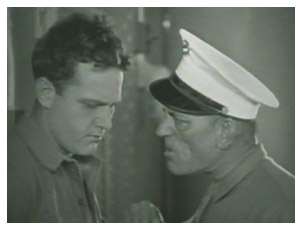 catches
himself as he is about to put his hand to his cheek - shakes it
away as if waking himself up and quickly goes about getting himself
ready to leave. This is a charming performance by Chaney that
continues to build our admiration for Sgt. O'Hara.
catches
himself as he is about to put his hand to his cheek - shakes it
away as if waking himself up and quickly goes about getting himself
ready to leave. This is a charming performance by Chaney that
continues to build our admiration for Sgt. O'Hara.
The next sequence is designed to build some sympathy for Burns and begin to show us a better side to his character. As he is leaving, Norma stops him and asks if she can speak to him. He treats her coldly at first, but agrees, and they step inside a building. She apologizes and tells him she hates a squealer as much as he does (why does she feel the need to apologize?). But then, Burns exhibits the first remorse and humbleness that he has shown in the story. "If I wasn't the punkest Marine in the Corps, I'd ask you something, Norma - but I'm goin' to try hard to make good so I might have a chance with you some day." They kiss, he leaves for a moment, comes back, and they kiss again. Maybe there is hope for him yet - but, our disapproval of "Skeet" Burns isn't over yet.
At this point it must be mentioned that the story is very much enhanced by the unrequited and unexpressed love that Sgt. O'Hara has for Norma. He is exceptionally kind to her, smiling broadly at any opportunity to speak to her - yet he feels that, with his looks, he could never hope to win her love. A running joke in the film has O'Hara telling Norma, "You know, I've roamed . . " and she stops him in mid-sentence with, " . . . the world over and you never saw a girl like me!" Then they both laugh, but that's as close as O'Hara ever gets to expressing his feelings for her.
As a matter of fact, as much as the story continues to make it impossible to feel any sympathy for Burns, our admiration for O'Hara increases exponentially. One such instance takes place on Tondo Island where the ship has docked. Burns has his eye on a beautiful native girl, Zaya (and this immediately after his "touching" vow to Norma!). Sneaking out of the tent one night, he meets her in a hut - in spite of the fact that O'Hara has ordered the recruits to stay away from the native girls. It appears they are about to kiss, but Zaya begins to scratch, first her back, then reaching inside the front of her dress. Burns obviously fears there may be some hygiene issues here, and\ he refuses her advances. When he does, she becomes almost aggressively amorous. A native sees him grappling with her to break her grip on him, and a fight ensues. Soon there are other natives, and both O'Hara and Burns' buddy Corporal Madden come to the rescue. After defeating the natives, they are bloody and exhausted. Burns puts his hand out in a gesture of thanks to O'Hara. Instead of shaking hands, O'Hara socks him on the chin.
Another instance in which Burns continues to lose our sympathy and O'Hara continues to gain our respect takes place when they arrive in Shanghai. We see Burns on board looking at several envelopes addressed to Norma. He pulls back the envelopes to reveal a letter that says, "I'm returning your letters unopened. Your affair at Tondo Island is common gossip and I thoroughly resent your writing me after that. Norma Dale."
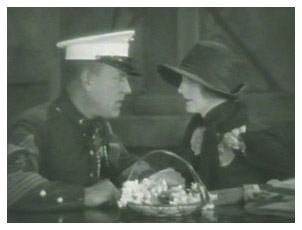 Then we see the hospital
ship arrive, and Norma is on it. O'Hara runs into her on a street
in a rickshaw. Then Burns sees them and walks up. Gallantly,
O'Hara walks away to allow them to speak alone. Norma wants nothing
to do with Burns and tells him that her letter was very clear.
We see a closeup of Burns, supposedly looking very humble and
pitiful. "I was foolish once on Tondo Island . . . but I've
tried to make up for it ever since." She tries to leave,
but Burns holds her up. She motions for O'Hara to come back.
"I'm wise," Burns tells her. "He's thrown the
hooks into me to boost himself!"
Then we see the hospital
ship arrive, and Norma is on it. O'Hara runs into her on a street
in a rickshaw. Then Burns sees them and walks up. Gallantly,
O'Hara walks away to allow them to speak alone. Norma wants nothing
to do with Burns and tells him that her letter was very clear.
We see a closeup of Burns, supposedly looking very humble and
pitiful. "I was foolish once on Tondo Island . . . but I've
tried to make up for it ever since." She tries to leave,
but Burns holds her up. She motions for O'Hara to come back.
"I'm wise," Burns tells her. "He's thrown the
hooks into me to boost himself!"
O'Hara and Norma go in a restaurant. She asks him, "Don't you think I'm right to never see him again?" Once again, O'Hara does something that can only be called "classy." After a moment's pause, he says, "Never? Are you sure that's what you mean?" When she says she does mean it, O'Hara tells her, "I think you're turning him down just when he needs you most." We are almost disappointed with the response; however, O'Hara gives us reason to admire and respect him.
By the way, Burns later confronts O'Hara with his belief that the sergeant has tried to make him look bad in front of Norma. "Sergeant or no Sergeant . . . the time's over when you can double-cross me to set yourself in right!"
"So that's all you've learned about me in three years," O'Hara says.
"I've learned one thing . . . that you hate my guts. Well . . . I hate yours!" Burns spews. O'Hara says something for which no intertitle is given and walks away. Actually, we are amazed - and a little disappointed - that he didn't punch Burns out then and there - but again, he takes the "classy" route.
There are some humorous moments in the film - almost all at the expense of Burns getting his "come-uppance - yet, they are woven well into the story and do not detract from the drama. For example, on the train to San Diego, Burns is flippant and rude to an elderly man on the train. What he doesn't realize is this is the Commander of the Marine base. In another instance, Burns picks a fight with a sailor on the ship. O'Hara provides them a way to settle their dispute in the boxing ring. Sitting in his corner waiting for the match to begin, Burns confidently leans over to O'Hara and tells him, "Watch me sink the Navy!" His confidence disappears quickly, though, when he hears the announcer identify his opponent as the heavyweight champion of the Navy. Of course, Burns is knocked silly within a few seconds of the start of the fight.
It's not revealing anything the reader would not have already guessed to note that Burns ends up proving himself worthy of the title of Marine and winning the girl. This all happens because he stays by O'Hara's side during a battle with some Filipino bandits. The sergeant is wounded and orders Burns to leave and save himself. Of course, Burns refuses, and the bandits are finally defeated when American planes arrive. The story suffers, though, in that all of Burns' past sins are forgiven solely on the basis of this one heroic deed. At the end of the story, after leaving the Marines, he actually asks O'Hara to join him and Norma in the running of a ranch they have purchased. Of course, O'Hara's life is the Marines, and the story ends as it began - with a group of young, raw recruits arriving who need the sergeant's tough guidance to whip them into real Marines.
It's no wonder that the Marine Corps bestowed Chaney with an honorary lifetime membership, the first time an actor had ever received this honor. (4) His portrayal was certainly an illustrious tribute to the men of the Marine Corps. As a matter of fact, Chaney became good friends with General Smedley Butler, the commander of the Marine base in San Diego. Their mutual admiration led to a friendship that lasted until Chaney's death.
Filming took place with full cooperation from the Marines at the Marine Corps base in San Diego, at the local train station and along several streets in the city. The battleship USS California was used for the scenes at sea - a ship that was later lost in the attack on Pearl Harbor, Dec. 7, 1941. (5)
Discussion of this film cannot go without mentioning the contributions of the lovely Eleanor Boardman. She is perfectly cast as the object of affection for both O'Hara and Burns. In her scenes with Chaney, one can't help but believe the loving smile on his face is not just acting - but also because Boardman's alluring charm would simply cause such a reaction. Her coyness with O'Hara is cute, and she brings just enough liveliness to her actions to avoid becoming a giddy schoolgirl but, instead, charm us with her spirit. As the New York Times reviewer observed, "Miss Boardman is the sort of nurse that would be apt to turn any marine's head." (6)
As noted, critics praised the film. Variety raved, "'Tell It to the Marines' is a sure fire box office if ever there was one," adding, "The chances are that (it) will undoubtedly get from five to six months at the little Embassy and get money, too. When it reaches the picture houses, it will be a clean up." (7) Harrison's Reports said simply, "Excellent. It is, in fact, a better picture than any Mr. Chaney has ever been in." (8) Motion Picture Magazine lauded Chaney with, "He is a great actor and lifts himself out of the make-up artist class into real drama," adding "This picture will be as popular as any we have had in many a day, and will go down on record as one of Chaney's greatest." (9)
The Turner Classic Movies presentation of this film available through Warner Archives (www.wbshop.com) is a pristine print with a superb music score by Robert Israel.
References
1. Blake, Michael F. Lon Chaney: The Man Behind the Thousand Faces.
Vestal Press, Lanham, Md. 1990.
2. Ibid.
3. Internet Movie Database
4. Blake.
5. Blake.
6. "Tell It to the Marines" review. The New York Times.
December 21, 1926.
7. "Tell It to the Marines" review. Variety. December
29, 1926.
8. "Tell It to the Marines" review. Harrison's Reports.
January 1, 1927.
9. "Tell It to the Marines" review. Motion Picture
Magazine. March 1927.
Copyright 2012 by Tim Lussier. All rights reserved